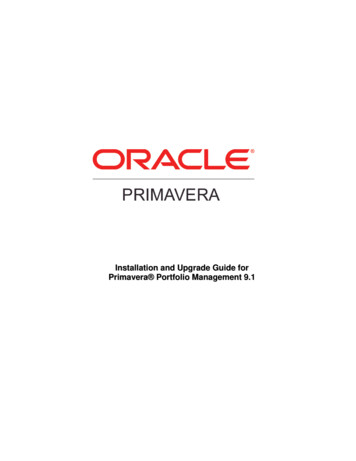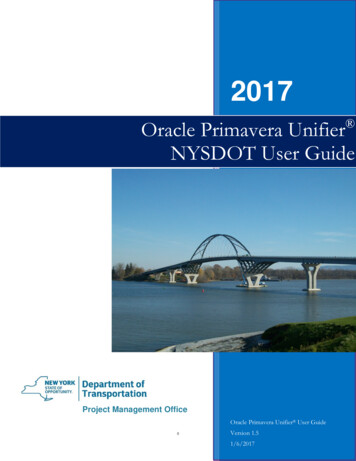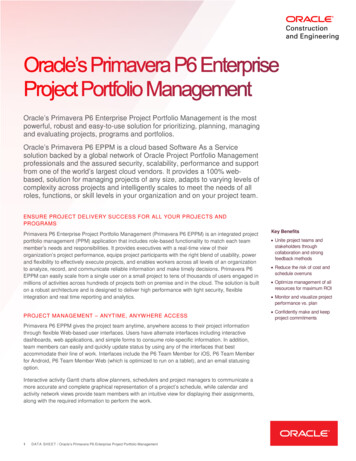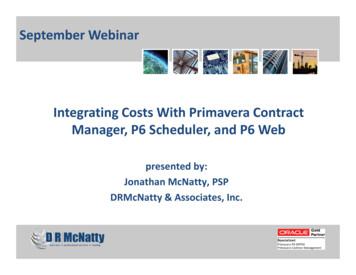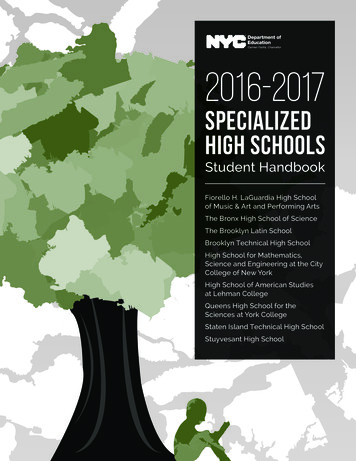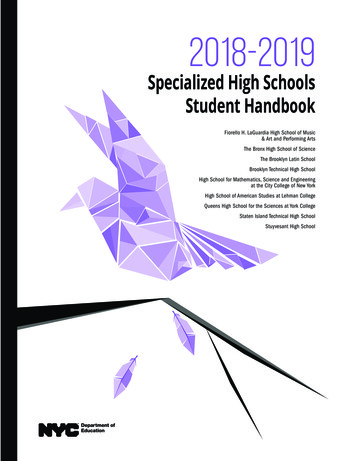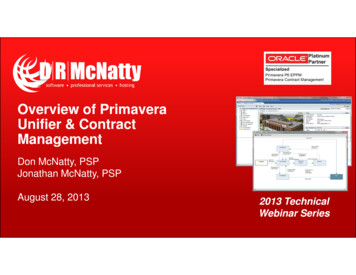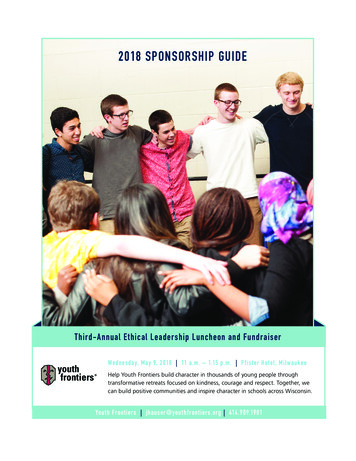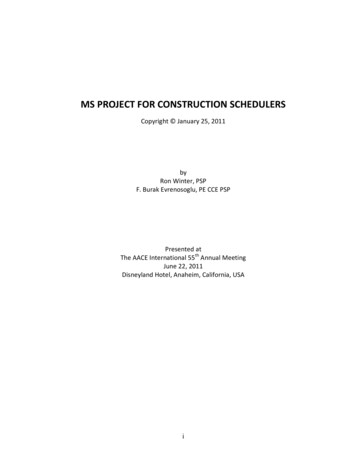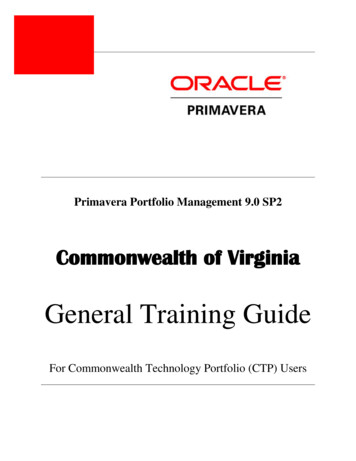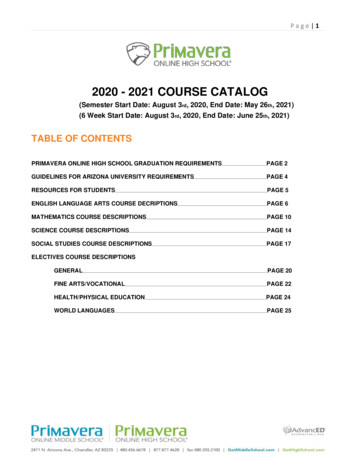
Transcription
Page 12020 - 2021 COURSE CATALOG(Semester Start Date: August 3rd, 2020, End Date: May 26th, 2021)(6 Week Start Date: August 3rd, 2020, End Date: June 25th, 2021)TABLE OF CONTENTSPRIMAVERA ONLINE HIGH SCHOOL GRADUATION REQUIREMENTSPAGE 2GUIDELINES FOR ARIZONA UNIVERSITY REQUIREMENTSPAGE 4RESOURCES FOR STUDENTSPAGE 5ENGLISH LANGUAGE ARTS COURSE DECRIPTIONSPAGE 6MATHEMATICS COURSE DESCRIPTIONSPAGE 10SCIENCE COURSE DESCRIPTIONSPAGE 14SOCIAL STUDIES COURSE DESCRIPTIONSPAGE 17ELECTIVES COURSE DESCRIPTIONSGENERALPAGE 20FINE ARTS/VOCATIONALPAGE 22HEALTH/PHYSICAL EDUCATIONPAGE 24WORLD LANGUAGESPAGE 25
Page 2GRADUATION REQUIREMENTSStudents that successfully complete the following requirements will be eligible to receive aPrimavera Online High School Diploma:STATE ASSESSMENT REQUIREMENTStudents in grades 3-8 and grade 10 must be tested in Spring 2021. All students willparticipate in their grade level ELA and math assessments only. High school End-of-Course(EOC) testing has been eliminated. High school students in other grades/cohorts are noteligible to test on AzM2. Therefore all eligible Primavera students are required to take theAzM2 tests. The statewide assessment for science must be administered to students ingrades 4, 8, and high school. High school students in grade 9 who are enrolled in a lifescience course may participate. Students in grade 10 who did not participate in the Spring2020 administration of AIMS Science must be tested in the Spring 2021 administration. AIMSScience is a computer-based assessment. Primavera provides notification of testing dates andlocations around the State through the Primavera website, regular mail, email, and theparent/student portals. Instructors proctor the tests on dates specified by the ADE. All studentsmust participate in the state assessment or take a make-up test if absent during the testingdates. For further information, refer to the Arizona State Department of Education website atwww.ade.state.az.us.All students are required to participate in state testing; failure to participate may resultin review of continued enrollment.EARLY GRADUATIONStudents who meet graduation requirements prior to the final term of the school year will receivetheir diploma at the end of the school year at the graduation ceremony. Students that do notattend the ceremony will have their diploma mailed to the contact address on file or they maypick it up during office hours starting the Monday after the graduation ceremony.GRADUATION DEFICIENCIESStudents who fail to meet all graduation requirements by June 30, 2021 will not be eligible toparticipate in the 2020-21 graduation ceremony. Students will be given the opportunity tocontinue taking courses up to the age of 22 to fulfill graduation requirements and receive aPrimavera Online High School diploma.NATIONAL COLLEGIATE ATHLETIC ASSOCIATION – NCAAPlease check with the NCAA guidance counselor for information regarding NCAA academicrequirements or visit www.eligibilitycenter.com
Page 3CLASS OF 2021 (AND BEYOND) PRIMAVERAGRADUATION REQUIREMENTS:CourseEnglishMathScienceWorld History/GeographyAmerican HistoryAmerican GovernmentEconomicsPhysical EducationHealthCareer Tech Ed/Voc Ed/Fine ArtsElectivesCivics Test (Per House Bill 2064)CPR RequirementTotalCredits4 Credits4 Credit3 Credits1 Credit1 Credit.5 Credit.5 Credit.5 Credit.5 Credit1 Credit6 CreditsPassMet22 CreditsNOTES:At POHS, courses are taken in state approved sequential order. For example, studentsneeding to take an English 9 course will take the first semester, English 9A, before the secondsemester, English 9B, and students required to take Algebra 1 will take the first semester,Algebra 1A, before the second semester, Algebra 1B. Students will take courses in theapproved sequence to ensure retention and mastery of curriculum material and promotesuccess on state level assessments.English (4 credits) – This requirement will be met by completing the following courses orcourses that are equivalent to: English 9A, English 9B, English 10A, English 10B, English 11A,English 11B, English 12A and English 12B. Some ELD courses may meet Englishrequirements for graduation.Math (4 credits) – This requirement will be met by completing the following courses or coursesthat are equivalent to: Algebra 1A, Algebra 1B, Geometry A, Geometry B, Algebra 2A, Algebra2B, and one credit of a fourth year math course.
Page 4Qualifying students may complete a personal curriculum math plan.Students receiving a personal math plan must complete one credit in mathematics thatincludes significant math content during their senior year.Science (3 credits) – This requirement will be met by earning three credits in science, one ofwhich must be Biology or a Life Science.Pursuant to A.R.S. 15-701.01(A)(2), all high school students must pass a Civics exam with ascore of 60% or higher and complete CPR (Cardio Pulmonary Resuscitation) instructionpursuant to A.R.S. 15-718.01, to be eligible for high graduation. Please contact the guidancedepartment if you have questions (480-405-2714).GUIDELINES FOR ARIZONA UNIVERSITY ENTRANCE REQUIREMENTSCourseEnglishAlgebra 1GeometryAlgebra 24th Year MathScience (must be a Lab Science)World History/GeographyAmerican HistoryAmerican GovernmentEconomicsPhysical EducationHealthFine ArtsElectivesWorld Languages (must be the same Language)Civics Test (Per House Bill 2064)CPR RequirementTotalCredits4 Credits1 Credit1 Credit1 Credit1 Credit3 Credits1 Credit1 Credit.5 Credit.5 Credit.5 Credit.5 Credit1 Credit4 Credits2 CreditsPassMet22 CreditsNOTES:University requirements include Arizona and Primavera high school graduation creditrequirementsMust also meet Reading, Writing and Math Assessment requirements (check with each stateuniversity for requirements)Must earn C or higher in all core courses above. This does not include Electives, Health andPhysical Education
Page 5Recommended: ACT or SAT test – minimum recommended score ACT – 22; SAT – 1040Contact the college or university of your choice for specific entrance requirements, includingGPA, class rank or test scoresNATIONAL COLLEGIATE ATHLETIC ASSOCIATION – NCAAPlease check with the NCAA guidance counselor for information regarding NCAA academicrequirements or visit www.eligibilitycenter.comRESOURCES FOR STUDENTSTURNITINTo maintain academic integrity of Primavera Online High School (POHS) online courses,Turnitin is used for applicable projects and assignments. Turnitin, a leading originality checkingand plagiarism prevention service, is used as a tool to support student academic achievementand integrity in the following areas: preventing plagiarism, improving writing skills, andproviding effective feedback.Upon submitting a piece of student work, Turnitin will determine if text in a project/assignmentmatches text in a database housing more than 12 billion pages of digital content. Turnitin doesnot determine plagiarism; it does locate matching text to help teachers determine if plagiarismhas occurred.
Page 6COURSE DESCRIPTIONSENGLISH LANGUAGE ARTSENGLISH 9AFRESHMEN ENGLISHIn this course, students read and analyze both literary and informational texts, including autobiographies,personal memoirs, newspaper and magazine articles, and poetry. Students understand explicit and inferredmeaning and identify support for them. They also learn how figurative language impacts the text. In addition,students learn about basics in grammar, usage, and punctuation. They also learn vocabulary words, and Greekand Latin affixes, and roots. In addition, they learn the elements of writing so that they can plan, write, revise,and edit their own personal memoir and literary analysis. Through the lessons provided in this course, theymaster techniques that will help them achieve a deeper appreciation of literary and informational texts.SUGGESTED GRADE LEVEL: 9PRE-REQUISITES: NoneENGLISH 9BFRESHMEN ENGLISHIn this course, students read and analyze both literary and informational texts. These texts take many differentforms, including biographies, short stories, newspaper and magazine articles, poetry, and influential historicaldocuments. The course’s reading selections demonstrate ways to understand explicit and inferred meaningthrough textual evidence; theme, central ideas, and details that support them; and structural elements and theirinfluence on style, among other ideas and concepts. Throughout this course, you will read the novel Anthem byAyn Rand. They will also examine informational texts to better understanding of historical moments throughoutthe history of the United States, including presidential speeches and a famous letter written by Martin LutherKing Jr. during his imprisonment in a Birmingham jail at the height of the civil rights movement. As they read theselections in this course, students practice ways to recognize textual evidence, identify themes and centralideas, make inferences, and identify figurative and connotative language in a variety of texts. In addition,students review information on context clues and word nuances, and learn about spelling conventions, stylemanuals, phrases clauses, parallel structure, semicolons, and colons. Students also learn the definitions, partsof speech, and etymology of various vocabulary words you will see throughout the reading selections. Inaddition, they learn the elements of writing so that you can plan, write, revise, and edit informational essay andargument essays.SUGGESTED GRADE LEVEL: 9PRE-REQUISITES: English 9AHONORS ENGLISH 9AFRESHMEN ENGLISHIn this course, students read and analyze both literary and informational texts, including autobiographies,personal memoirs, newspaper and magazine articles, and poetry. Students understand explicit and inferredmeaning and identify support for them. They also learn how figurative language impacts the text. In addition,
Page 7students learn about basics in grammar, usage, and punctuation. They also learn vocabulary words, and Greekand Latin affixes, and roots. In addition, they learn the elements of writing so that they can plan, write, revise,and edit their own personal memoir and literary analysis. Through the lessons provided in this course, theymaster techniques that will help them achieve a deeper appreciation of literary and informational texts.SUGGESTED GRADE LEVEL: 9PRE-REQUISITES: NoneHONORS ENGLISH 9BFRESHMEN ENGLISHIn this course, students read and analyze both literary and informational texts. These texts take many differentforms, including biographies, short stories, newspaper and magazine articles, poetry, and influential historicaldocuments. The course’s reading selections demonstrate ways to understand explicit and inferred meaningthrough textual evidence; theme, central ideas, and details that support them; and structural elements and theirinfluence on style, among other ideas and concepts. Throughout this course, you will read the novel Anthem byAyn Rand. They will also examine informational texts to better understanding of historical moments throughoutthe history of the United States, including presidential speeches and a famous letter written by Martin LutherKing Jr. during his imprisonment in a Birmingham jail at the height of the civil rights movement. As they read theselections in this course, students practice ways to recognize textual evidence, identify themes and centralideas, make inferences, and identify figurative and connotative language in a variety of texts. In addition,students review information on context clues and word nuances, and learn about spelling conventions, stylemanuals, phrases clauses, parallel structure, semicolons, and colons. Students also learn the definitions, partsof speech, and etymology of various vocabulary words you will see throughout the reading selections. Inaddition, they learn the elements of writing so that you can plan, write, revise, and edit informational essay andargument essays.SUGGESTED GRADE LEVEL: 9PRE-REQUISITES: Honors English 9AENGLISH 10ASOPHOMORE ENGLISHStudents strengthen their knowledge and understanding of the different styles and types of writing. Emphasis isplaced on the specific and separate trait qualities of the 6-Traits of Writing: functional, expository, expressive,persuasive, and research. At the same time, they learn how to relate to and utilize the written word in their ownlives.SUGGESTED GRADE LEVEL: 10PRE-REQUISITES: English 9BENGLISH 10BSOPHOMORE ENGLISHEnglish 10B: World Literature broadens students' reading experience with exposure to literature from around the world.Students evaluate diverse reading selections such as epics, persuasive narrations, cause/effect essays, plays, andpoetry using a wide variety of literary elements. Students are encouraged to connect and relate to the various authorsand gain deeper appreciation and understanding of other cultures through the contexts of the passages. In addition,students are guided through an active reading process that increases their ability to make inferences as well as tocomprehend and analyze a variety of materials. Students are expected to respond to assigned reading materials in avariety of activities and are graded on their ability to review, summarize, analyze, and connect to the materialsappropriately. Additionally, students practice important reading strategies such as determining the meanings of unfamiliarwords. They produce an independent vocabulary assignment as evidence of their familiarity with these strategies.Students are also expected to create original materials in an effort to grasp the complexity of the genres studied.SUGGESTED GRADE LEVEL: 10PRE-REQUISITES: English 10A
Page 8HONORS ENGLISH 10ASOPHOMORE ENGLISHEnglish/Language Arts II (10th grade) courses usually offer a balanced focus on composition and literature.Typically, students learn about the alternate aims and audiences of written compositions by writing persuasive,critical, and creative multi-paragraph essays and compositions. Through the study of various genres of literature,students can improve their reading rate and comprehension and develop the skills to determine the author’s intentand theme and to recognize the techniques used by the author to deliver his or her message.SUGGESTED GRADE LEVEL: 10PRE-REQUISITES: English 9BHONORS ENGLISH 10BSOPHOMORE ENGLISHEnglish/Language Arts II (10th grade) courses usually offer a balanced focus on composition and literature.Typically, students learn about the alternate aims and audiences of written compositions by writing persuasive,critical, and creative multi-paragraph essays and compositions. Through the study of various genres of literature,students can improve their reading rate and comprehension and develop the skills to determine the author’s intentand theme and to recognize the techniques used by the author to deliver his or her message.SUGGESTED GRADE LEVEL: 10PRE-REQUISITES: Honors English 10AENGLISH 11AJUNIOR ENGLISHIn this course, you will read and analyze informational and argumentative texts across a number of genres andfrom a number of sources, including government publications and websites, magazine articles, legal proceedings,and video presentations. Through the presentation of topics as varied as zombie insects, Mars exploration, and theneed for sleep, the course demonstrates ways to understand central ideas, organizational structures, andtechniques of composition. You will examine argumentative writing in seminal US documents, such as the work ofJohn Adams and speeches by 20th-century US presidents. You will also learn how to interpret consumerdocuments such as government publications and financial information. These examples will help you to evaluateuse of language, determine meanings, make inferences, grasp central ideas, evaluate bias, and draw conclusions.The course also will instruct you in speaking and writing formally, and in using rhetorical devices to persuadeaudiences. As you read the selections in this course, you will practice ways to analyze evidence, recognizesymbolism, examine word choice, and identify figurative language in informational writing. You will also reviewbasics in spelling, grammar and usage, and punctuation. Writing activities will give you tips and techniques as youresearch and organize expository and argumentative compositions. Through the lessons provided in this course,you will master techniques that help you achieve a deeper appreciation of informational and argumentative texts.SUGGESTED GRADE LEVEL: 11PRE-REQUISITES: English 10BENGLISH 11BJUNIOR ENGLISHEnglish 11B is a survey of American literature from before the Declaration of Independence to the present. Herestudents gain a deeper appreciation and understanding of American culture through examination of the literature ofeach major era. Emphasis is placed on the works of major American authors and literary movements. Vocabulary,oral communication, formal communications, and research skills are also included.
Page 9SUGGESTED GRADE LEVEL: 11PRE-REQUISITES: English 10AHONORS ENGLISH 11AJUNIOR ENGLISHEnglish/Language Arts III (11th grade) courses continue to develop students’ writing skills, emphasizing clear,logical writing patterns, word choice, and usage, as students write essays and begin to learn the techniques ofwriting research papers. Students continue to read works of literature, which often form the backbone of the writingassignments. Literary conventions and stylistic devices may receive greater emphasis than in previous courses.SUGGESTED GRADE LEVEL: 11PRE-REQUISITES: English 10BHONORS ENGLISH 11BJUNIOR ENGLISHEnglish/Language Arts III (11th grade) courses continue to develop students’ writing skills, emphasizing clear,logical writing patterns, word choice, and usage, as students write essays and begin to learn the techniques ofwriting research papers. Students continue to read works of literature, which often form the backbone of the writingassignments. Literary conventions and stylistic devices may receive greater emphasis than in previous courses.SUGGESTED GRADE LEVEL: 11PRE-REQUISITES: Honors English 11AENGLISH 12ASENIOR ENGLISHAdvanced Composition and Rhetoric is the first semester of the 12th grade English Language Arts course. Thiscourse covers the art and craft of rhetoric—persuasion and argument—using informational and nonliterary texts,with a special emphasis on the understanding of reasoning and logic. These texts include documents andspeeches that have been integral to the development of legal and social policy in the United States.The course builds in depth and complexity from beginning to end, starting with instruction on central ideas andword choice. In this course, students will learn the everyday tools of persuasion, including ethos, pathos, andlogos. These serve as the foundation for understanding more complex topics, such as the elements of argumentand the chain of legal reasoning used in court cases and historical documents.Note: This course is also available for Dual Enrollment Credit; please speak to a Guidance CounselorSUGGESTED GRADE LEVEL: 12PRE-REQUISITES: English 11BENGLISH 12BSENIOR ENGLISHExploration of British Literature covers in-depth literary analysis—comprehension and evaluation—using a widevariety of narrative texts from British literature. Texts cover eras from the Middle Ages through modern times.Students will acquire the necessary skills for gaining a deeper understanding of literature and literary analysis.The course builds in depth and complexity, starting with instruction on explicit and implicit meanings, use offigurative language and literary devices, and development of central ideas and themes. Students integrate ideasfrom multiple texts to compare and contrast the treatment of narrative and structural elements. These skills serveas the foundation for understanding the ways in which literature and language evolve, and appreciating authorsand styles from many eras of British literature. The course includes two writing projects: a fictional na
Primavera Online High School Diploma: STATE ASSESSMENT REQUIREMENT Students in grades 3-8 and grade 10 must be tested in Spring 2021. All students will participate in their grade level ELA and math assessments only. High school End-of-Course (EOC) testing has been eliminated. High school students in other grades/cohorts are not
